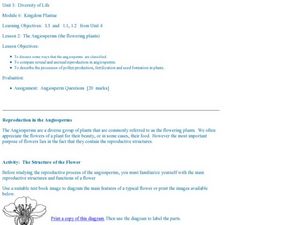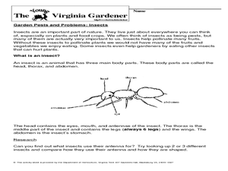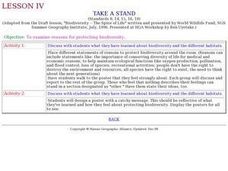Curated OER
Bats are Our Buddies!
For this bats worksheet, students click on the links in the questions about bats to find the answers to the questions and then come back and answer the questions. Students answer 19 questions total.
Curated OER
Bugs in the Woods
Second graders identify insects and plants in the forest ecosystem in a structured field trip with stations and activity booklets. In this bugs lesson, 2nd graders explore the ecosystem of the forest, complete the booklet and play...
Curated OER
The Angiosperms
Young scholars study angiosperms and their classifications. In this investigative lesson students compare the sexual reproduction of angiosperms and seed formations.
Curated OER
New super-sweet tomato hits the shelves!
Seventh graders examine the growth of the new tomato in the United Kingdom. In this Agriculture lesson, 7th graders read an article and answer guided reading questions. Students participate in a discussion in pairs about fruits and...
Curated OER
The Seed Match
Students study seeds and plants. In this science lesson, students explore seeds from various types of plants and complete a worksheet about seeds. Students discuss plants that are fruits and vegetables and where they grow.
Curated OER
Pollen Collection And Identification
Young scholars investigate plant reproduction, pollen collection and identification. They collect pollen samples over a twenty four hour period and examine them under a microscope.
Curated OER
Make Way for Wild Migrants
Students discuss the threats facing migratory species and track the seasonal journeys of wildlife in real space and in cyberspace. Once they have gathered information from several sources, they create a portfolio to share with others...
Curated OER
Bat Facts
Student's demonstrate an understanding of basic facts about bats by creating a picture representation of bats in their habitat describing information they learned. The lesson is especially favorable for visual learners.
Curated OER
Exploring Bats
Third graders create a graphic organizer about bats in cooperative groups. The graphic organizer is used to illustrate the information that has been researched. The specific graphic organizer is the KWL.
Curated OER
"In/Out Tables of Potential Crop Loss from Defoliation
In this economics worksheet, 4th graders use the data to determine the effects of crop loss due to defoliation from the effects of hail at different stages of growth.
Curated OER
Flower Structure and Reproduction
In this flower structure worksheet, students read the information on flower structure and reproduction. Students answer questions based on the reading provided.
Curated OER
Tree Identification
In this tree identification worksheet, students collect samples from different trees and identify them using the deciduous tree guide or the conifer key.
Curated OER
The Young Virginia Gardener: Fun With Plants
In this gardening worksheet, learners complete lists of things that help plants, hurt them or can do both. Students then read a short passage about how temperature can either help or hurt plants.
Curated OER
The Young Virginia Gardener: Garden Pests and Problems-Insects
In this garden pests and problems instructional activity, students read about insects and research what insects use their antenna for, comparing 2 or 3 different types.
Curated OER
Habitats and Functions
Students analyze and discuss insect diversity and all of the functions that insects perform in nature. They examine habitat and function cards, and distribute themselves by function and habitat.
Curated OER
Environmental Science/Water Pollution
Learners study natural habitats, aquatic life, renewable and non-renewable resources. They discuss conservation efforts for sea otters and desert toad in this units.
Curated OER
Eelgrass Bed Exploration
Pupils study the function and biological value of eelgrass beds. They discover the habitat requirements of the beds by reading a hand-out and completing a worksheet.
Curated OER
Catch As Catch Can
Students capture and observe insects. Using provided netting, students design and create a butterfly net. They study many types of insects and their benefits. After identifying insects caught, students complete a graph. Students write...
Curated OER
Would You Like to Attend School in Japan?
Sixth graders construct pro and con T-charts about their education system and that of Japan. They choose which system they prefer and give five reasons for it. Their reasons must be based on strong arguments and evidence.
Curated OER
Bat Habitat
Ninth graders engage in a lesson plan to find the role of bats in the complexity of certain ecosystems. They identify where bats live and the daily role played in the ecosystem. Students also construct a bat house to help control the...
Curated OER
Pollen Tube Growth
Students demonstrate the proper usage of the compound and dissecting microscopes. They identify the parts of a flower and the functions of the flower parts. Students describe the process of gamete formation and fertilization in a flower.
Curated OER
Spring Collecting and Identifying Bumble Bees
Students collect bumble bees in the field, record data, identify and release specimens, answer conclusion questions, and send data in to researcher leaders. They make research based conclusions based upon the evidence.
Curated OER
A World of Feathered Friends
students will learn to
respect the nature around them. This respect is vital because ignorance of surrounding
nature can lead to carelessness when curiosity goes awry. A perfect example of this
wayward curiosity took place at our school...
Curated OER
IN STRAWBERRY FIELDS
The student will calculate wages of agricultural workers by the hour and by the piece.2. Share background material, and discuss the difference between gross pay and net pay and the difference between getting paid by the hour or the piece...
Other popular searches
- Bees Pollination
- Flower Parts and Pollination
- Pollination Flow Chart
- Cross Pollination
- 6 Steps of Pollination
- Pollination Activities
- Pollination Flowchart
- Pollination Process
- Pollination and Fertilization
- Plants Pollination
- Cross Pollination
- Plants Cross Pollination

























